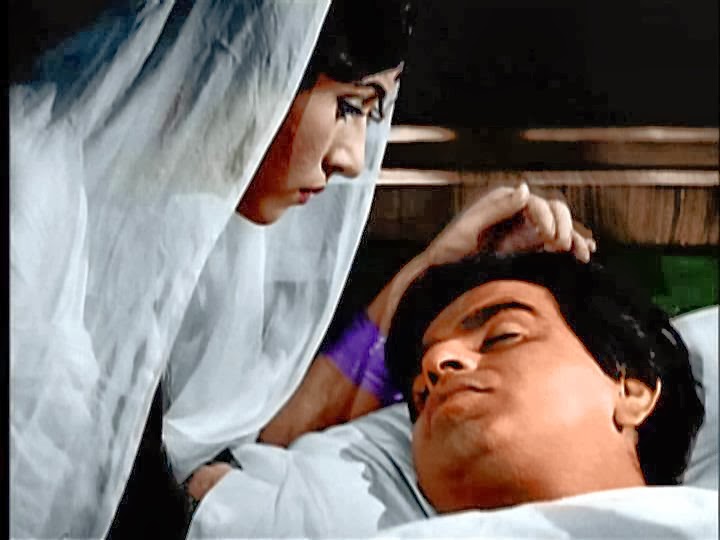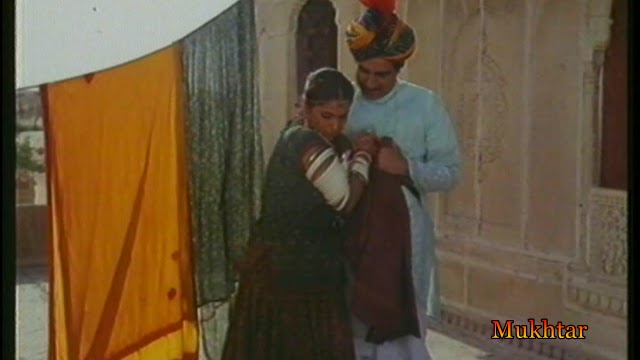Tum Apna Ranj-O-Gham Apni Preshani .. JAGJIT KAUR ..Madhubala Dilip Kumar
(LYRICS- ENGLISH/ URDU) This beautiful and haunting song was created by Khayyam and his wife Jagjit Kaur sung in her inimitable voice. Khayyam sahab had said that even if Jagjit Kaur did not sing another song, this song would keep her alive for ever. Lyrics of this poignant song were written by Sahir Ludhianvi.
I have recompiled the video on my favourite couple Madhubala and Dilip Kumar. I hope you will like it.
LYRICS- ENGLISH /URDU with Translation
تم اپنا رنج و غم
तुम अपना रंज-ओ-ग़म अपनी परेशानी मुझे दे दो
तुम्हें ग़म की क़सम इस दिल की वीरानी मुझे दे दो
तुम्हें ग़म की क़सम इस दिल की वीरानी मुझे दे दो
ये माना मैं किसी क़ाबिल नहीं हूं इन निगाहों में
बुरा क्या है अगर ये दुख ये हैरानी मुझे दे दो
तुम अपना रंज-ओ-ग़म…
बुरा क्या है अगर ये दुख ये हैरानी मुझे दे दो
तुम अपना रंज-ओ-ग़म…
मैं देखूं तो सही ये दुनिया तुम्हें कैसे सताती है
कोई दिन के लिये अपनी निगहबानी मुझे दे दो
तुम अपना रंज-ओ-ग़म…
कोई दिन के लिये अपनी निगहबानी मुझे दे दो
तुम अपना रंज-ओ-ग़म…
वो दिल जो मैनें मांगा था मगर गैरों ने पाया था
बड़ी शै है मगर उसकी पशेमानी मुझे दे दो
तुम अपना रंज-ओ-ग़म
बड़ी शै है मगर उसकी पशेमानी मुझे दे दो
तुम अपना रंज-ओ-ग़म
تم اپنا رنج و غم
Tum apna ranj-O-gham
(Give me all your sorrow and grief)
اپنی پریشانی مجھے دے دو
Apni pareshaani mujhey de do
(Give it to me your troubles)
تمہیں غم کی قسم
Tumhein gham kii kasam
(I swear on your worries)
اس کی ویرانی مجھے دے دو
Is dil ki viiraani mujhey de do
( pass on to me loneliness of your heart)
یہ مانا میں کسی قابل نہیں ان نگا ہوں میں
Yeh mana Main kisi qabil nahiN huN in nigahoN meiN
Yeh mana Main kisi qabil nahiN huN in nigahoN meiN
(I know I have no worth in your eyes)
برا کیا ہے اگر۔۔ یہ دکھ یہ حیرانی مجھے دے دو
Bura kya hai agar.. Ye dukh Ye heiraani mujhey de do
(It won’t be bad if you share with me your grief and anguish)
میں دیکھوں تو سہی ۔۔ دنیا تمہیں کیسے ستاتی ہے
Main deikhuN to sahii۔۔ duniya tumheiN kaisey satati hai
(Let me see how this world would tease you)
کویؑ دن کے لیے اپنی نگہبانی مجھے دے دو
Koi Din Ke Liye Apani Nigahbani Mujhe De Do
(for a few days, give yourself into my safekeeping)
وہ دل جو میں نے مانگا تھا مگر۔۔ غیروں نے پایا تھا
Woh dil jo MaiN ne manga thaa magar..ghairon ne paya tha
(the heart which I begged, but the some other got it)
بڑی شے ھے اگر ۔۔ اس کی پشیمانی مجھے دے دو
Badi shae hai agar.. us ki pashemani mujhe de do
(It would be a great gift for me if you could give its anxiety)
تم اپنا رنج و غم
Tum apna ranj o-gham..........
Jagjit Kaur : Born in an affluent Punjabi Zamindar family she must have had a number of wealthy suitors, but she chose a struggling musician Khayyam to marry. When you hear the songs the two created together, you feel the pairing must have been made in the heaven.
Mohammed Zahur "Khayyam" Hashmi, better
known as Khayyam, is an Indian music
composer whose career spanned four decades (1953–1990).
He has won three Filmfare
Awards for Best Music in 1977 for Kabhi Kabhie and 1982 for Umrao Jaan,
and a lifetime achievement award in 2010 . He was awarded the 2007 Sangeet Natak Akademi Award in
Creative Music, by the Sangeet Natak Akademi, India's National
Academy of Music, Dance and Theatre. He has been awarded the third-highest
civilian honor, Padma Bhushan by the Government of India for 2011.
Khayyam has composed music for just over 50 films in his long career, yet his impact on listeners has been far greater than many who scored for several hundred movies. Khayyam shines out with his majestic performance; his delicate yet intricate melodies haunting us not just from screen but also in our private moments of pleasure and pain. No wonder connoisseurs hold Khayyam in high esteem for his immaculate standards of musical harmony, as his creativity symbolises Victor Hugo’s irrefutable belief that “music expresses that which cannot be put into words and that which cannot remain silent”.
Khayyam has composed music for just over 50 films in his long career, yet his impact on listeners has been far greater than many who scored for several hundred movies. Khayyam shines out with his majestic performance; his delicate yet intricate melodies haunting us not just from screen but also in our private moments of pleasure and pain. No wonder connoisseurs hold Khayyam in high esteem for his immaculate standards of musical harmony, as his creativity symbolises Victor Hugo’s irrefutable belief that “music expresses that which cannot be put into words and that which cannot remain silent”.
Khayyam was born as Sa’aadat Hussain in undivided Punjab in Rahon, a town in Nawanshahr District. As a boy Khayyam ran away
to Delhi to
learn music but was forced to return to complete his education. Khayyam then
went to Lahore to
learn music from the famous Baba Chishti.
He made his debut as Sharmaji of the Sharmaji-Varmaji
composer duo with the movie Heer Ranjha in
1948. He went solo after his co-composer Rahman Varma went to the newly created
Pakistan post partition. One of his earliest breaks was in the film Biwi in
which the song “Akele mein wo ghabrate to Honge” sung by Mohammed
Rafi was a huge hit. But he gained greater recognition from the film Phir
Subha Hogi starring Raj Kapoor and Mala Sinha,
in which songs written by Sahir
Ludhyanvi and sung by Mukesh and Asha
Bhonsle were set to tune by Khayyam, notable amongst them “Wo Subha
Kabhi to Aayegi”, “Aasman Pe hai Khauda aur Zameen pe Hum” and “Chin-o-Arab
Humara”.
The film Shola Aur Shabnam established
Khayyam’s reputation as a great composer. The songs written by Kaifi Azmi are
some of the greats of the Hindi Film Industry. From Shola aur Shabnam “Jaane
kya dhhonti rehti hein ye aanken mujhmen” sung by Rafi and “Jeet Hi lenge Baazi
Hum tum” sung by Lata and Rafi, from the Chetan Anand directed Aakhri Khat “Baharon
mera jeevan bhi Sawaron” by Lata and “Aur kuch der theher,a ur kuch der na ja”
by Rafi. Also, noticeable are songs from the film Shagun which
had Khayyam’s wife Jagjit Kaur sing “Tum apna
ranj-o-gham” and “Tum chali Jaogi”. From the film Lala Rukh “Hai Kali Kali ke
lab par” sung by Rafi and from Footpath “Shyam-e-Gham ki Kasam” sung
by Talat Mehmood. From Mohhabat Isko Kehte hein "Theheriye hosh mein aa
lun to chaley jaiyega" by Rafi and Suman Kalyanpur.
The 70’s saw Khayyam team up with Sahir
Ludhyanvi once again to work in the Yash Chopra-directed
“Kabhi Kabhi”. The songs were super hits
and showed Khayyam’s versatility with huge hits like “Kabhi Kabhi mere dil mein
Khayal ata hai” (Sung by Mukesh), “Tere chehre se nazar Nahin hatti” (Kishore
& Lata) and “Mein Pal do pal ka Shayar Hun” (Mukesh). The film Shankar
Hussain had Rafi sing "Kahin ek Masum Nazuk si Lardki" and
Lata render "Aaap yun Faaslon Se", both classic Khayyam songs.
Khayyam’s gave memorable music to the late 70’s and early
80’s was from Trishul, Thodi
Si Bewafaai, Bazaar and Noorie. Khayyam
also created music for the Kamal
Amrohi directed “Razia Sultan” and his “Aye dil-e-nadan” sung by Lata
capturing the mood beautifully. Khayyam was still to deliver his best and the
opportunity came in Muzaffar Ali’s Umrao Jaan in
1981. He made Asha Bhonsle sing songs which are indisputably
her best. “In Aankhon ki masti ke”, “Ye Kya Jagah hai doston” and “Dil Cheez
kya hai” are evergreen.
Khayyam always preferred to work with the poets having
strong background of poetry. That is the reason one finds poetry playing
an equal role in Khayyam's compositions as the music or the singer. Khayyam
prefers to give full freedom to the poets to express their views thereby making
the expression of the songs more poetic and more meaningful.
Unfortunately, in his twilight years, the death of his grown-up son Pradeep and the subsequent illness of Jagjit have made him stay away from recording studios. A pity, especially as the music scene today needs someone like him more than ever before to cure it of its banality. However, even if he never picks up the baton again, it is certain that transcending all religious, cultural and geographical barriers, Khayyam’s music will live forever in the hearts of his admirers around the world.
Unfortunately, in his twilight years, the death of his grown-up son Pradeep and the subsequent illness of Jagjit have made him stay away from recording studios. A pity, especially as the music scene today needs someone like him more than ever before to cure it of its banality. However, even if he never picks up the baton again, it is certain that transcending all religious, cultural and geographical barriers, Khayyam’s music will live forever in the hearts of his admirers around the world.




What a beautiful selection of Madhubala singing the song on screen with play back of Jagjit Kaur. Very few know this aspect. Even lyrics and music is Masha Allah. Thanks.
ReplyDeleteshagun film me ise suna tha aur aaj tk nhi maloom tha ki ye gana madhubala dilip sahb pr filmaya gayaa aur kisi dusri film ka hai. waise.....bda pyara gana hai aur shuru se mere psndida gaano me shamil hai
ReplyDeleteIndu Puri Ji, I have recompiled this video on my favourite couple Madhubala and Dilip Kumar. Thanks for liking
ReplyDeleteMukhtar
I have heard this song with different actress/actress pairs. Was it used in a more than one movie(Shaggon)?
DeleteThank you for sharing and your translation is excellent. Beautiful song.
ReplyDeleteLet me know if you have done translations of other songs or ghazals.
Superb work
I think this beutiful song is from film Shagun .
DeleteWaheeda Raheman and Kamaljeet with Achala Sachdev and not Deelip kumar and Madhubala